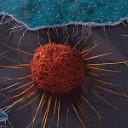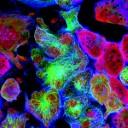-
Some Pancreatic Cancers Are Hereditary
A trio of recent studies indicates that pancreatic cancer is, in some cases, linked to mutations passed down from generation to generation.
by Cheryl Platzman Weinstock
-
July 13: The Week in Cancer News
An opinion piece discusses how the stigma surrounding opioids affects cancer patients, and a study provides data on treating melanoma patients with brain metastases.
by Kate Yandell
-
What Is ‘Chemo Brain’?
The National Cancer Institute's Todd Horowitz discusses cancer-related cognitive impairment.
by Anna Azvolinsky
-
Predicting Acute Myeloid Leukemia
Two studies identify genetic mutations that could predict the risk of an aggressive blood cancer up to a decade before it is diagnosed.
by Anna Azvolinsky
-
July 6: The Week in Cancer News
Studies explore what type of cervical cancer screening is most effective and whether patients with autoimmune diseases can take immunotherapy.
by Kate Yandell
-
June 29: The Week in Cancer News
Studies explore occupational hazards that could increase cancer risk, and the U.S. Food and Drug Administration approves a new combination therapy for melanoma.
by Kate Yandell
-
Exploring When Breath Becomes Air
Join our Facebook group to talk about themes in the poignant memoir by Paul Kalanithi.
by Marci A. Landsmann
-
Suicide Risk in Cancer Survivors
Study looks at gender difference in suicide rates among those who have been diagnosed with cancer.
by Cici Zhang
-
June 22: The Week in Cancer News
Experts debate direct-to-consumer genetic testing and studies shed light on breast reconstruction complications.
by Kate Yandell
-
Canine Comfort
Studies investigate whether visits from therapy dogs can increase the well-being of cancer patients and caregivers.
by Jen Tota McGivney
Cancer Talk
Lessons From 20 Years Living With Cancer
Multiple myeloma survivor Jonathan Gluck reflects on uncertainty, and the scientific progress that has kept him living with cancer for more than two decades.
by Eric Fitzsimmons
The Enduring Importance of Cancer Disparities ResearchOpening session from AACR conference highlights how perseverance and adversity have informed cancer disparities research over the years.
by Eric Fitzsimmons
Most Cancer Survivors Don’t Meet Healthy Diet GoalsDespite research linking fruits and vegetables to cancer survival, many people do not change their eating habits after diagnosis.
by Darlene Dobkowski
Many People Don’t Get Colonoscopy After Receiving Abnormal Blood TestsAbout half of people who receive abnormal results from colorectal cancer screening tests don’t follow up with a colonoscopy.
by Laura Gesualdi Gilmore














